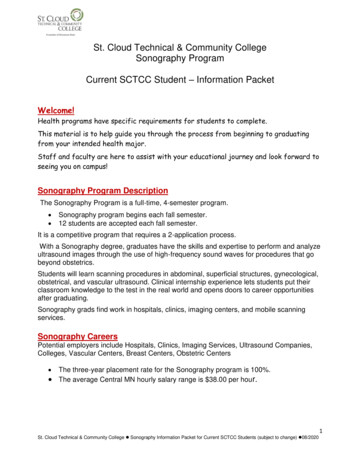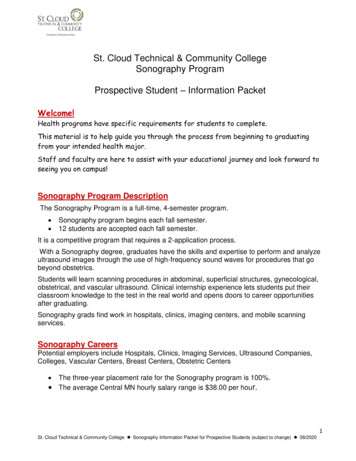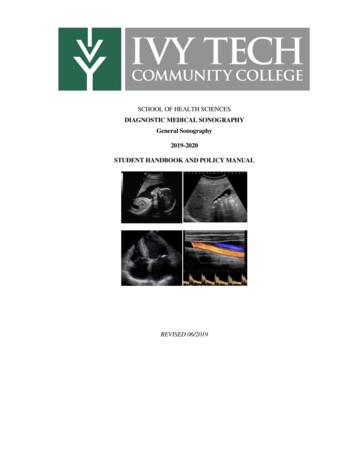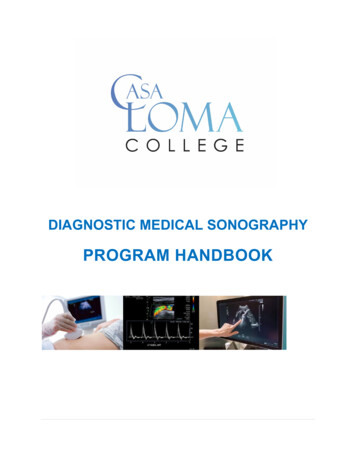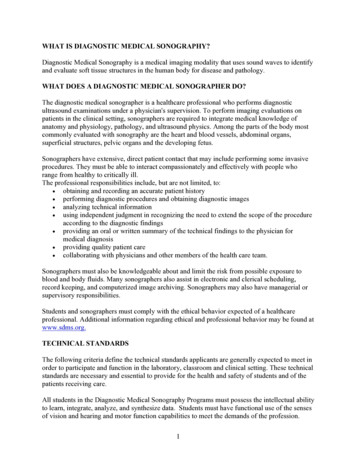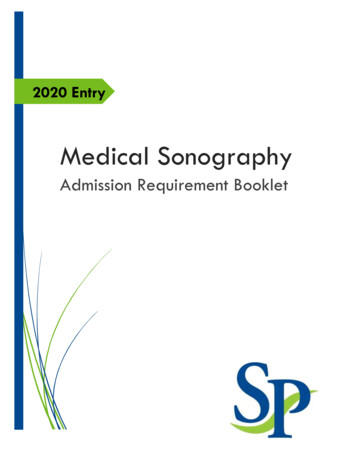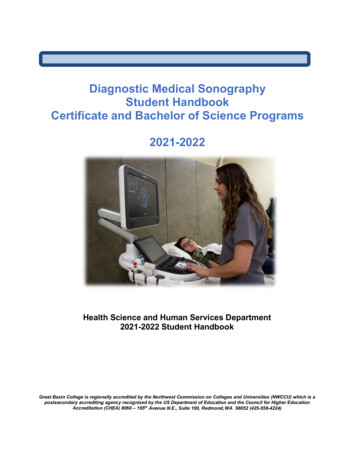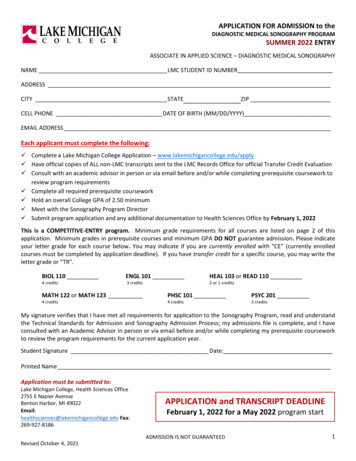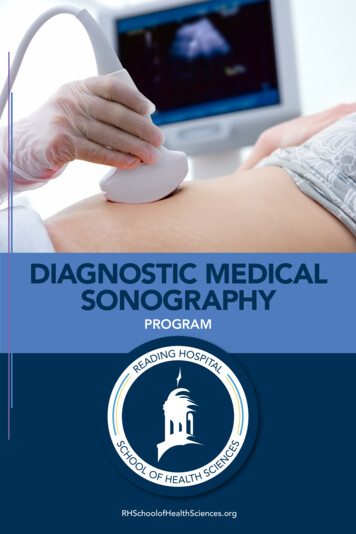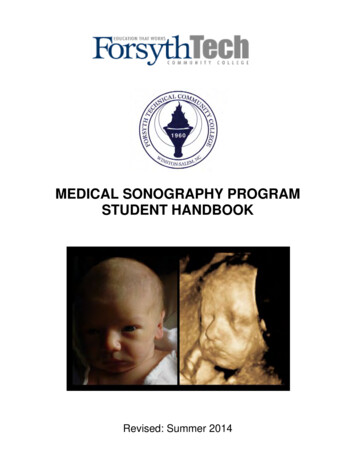
Transcription
MEDICAL SONOGRAPHY PROGRAMSTUDENT HANDBOOKRevised: Summer 2014
Sonography Program Student HandbookTable of Contents TopicsSection 1 – General InformationPage 1:An Introduction to the StudentPage 2:Mission StatementsPage 2:Program PhilosophyPage 3 - 4:ARDMS Mission StatementPage 5 - 6:Program GoalsPage 7:Accreditation, Curriculum Standards and Common Course LibraryPage 8:Program Evaluation and Assessment ProcedurePage 9 - 13:Steps For Choosing Your Prerequisite (For Certification) & ChartsPage 14:SPI Exam RequirementsPage 15 – 16: Organizational ChartsPage 17 – 19: Faculty and Administrative DirectoryPage 21:Forsyth Tech Academic Calendar for 2014-2015Page 22 - 24: Forsyth Tech Program Catalog Pages – Medical Sonography A.A.S. Degree ProgramPage 25 – 30: Required TextbooksPage 31:Student Sonographers Association (SSA)Page 32 – 35: By-Laws of Forsyth Tech Student Sonographers AssociationPage: 36 - 37: Professional Ultrasound OrganizationsPage 38:Professional Organization Student LetterPage 39 - 41: Professionalism and Ethics, Code of Professional Conduct for Diagnostic MedicalSonographers (SDMS)Page 42 – 64: Academic EtiquetteConfidentiality, Health Insurance Portability and Accountability Act (HIPAA)Section 2 – Program PoliciesPage 65 - 66: Attendance and Procedure for Making Up Missed ExamsPage 66 - 67: TardinessPage 67:Sleeping in Class and Inclement WeatherPage 68:Delayed Class Policy, Cell Phone & Electronic Device Usage, My Space and FacebookPage 69:Pregnancy, Working, and Computer LabPage 70:Drugs, Progression, Academic Probation, Academic Problems, and Academic AssistancePage 71 - 73: Accommodation for Disabilities & Academic AppealPage 73:Academic Review Committee & Disciplinary ProcedurePage 74:Readmission, Critical Requirements, and ExamsPage 75:Grading Scale & Honor PolicyPage 76:Field Trips, General Rules, Behavior in the Classroom & Student RecordsPage 77:Student Health Forms, Faculty Availability, Classroom Attire, Policy Violations, A Deathin the Family, & Scan Lab UtilizationPage 78:Homework, Email & Dropping a ClassPage 79:Recording Lectures, Instructionsl Scanning LabsPage 80:Practice Labs, Pre-Scanning Prep, Volunteer Patients & LecturesPage 81:Children on Campus, Inclement Weather Guidelines Additional College and ClinicalPoliciesPage 82 - 83: Academic Appeals, Academic Standing/Probation/DismissalPage 84:Summer Conversion FactorPage 85 - 88: Services for Students
Section 3 – Signature PagesThese forms are to be signed and returned to the Sonography Program Coordinator:Page 89:Forsyth Tech Community College Bioeffects Statement of NotificationPage 90:Student Confidentiality AgreementPage 91:Sonography Program Honor SystemPage 92:Critical Incident ReportPage 93:Medical Illness ExcusesPage 94:Physical Assessment Informed ConsentPage 95:Policy Violation Form SamplePage 97:Signature Forms Check-off SheetPage 98:Student Manual AcknowledgmentThese forms are to be completed only when each situation arises.Forsyth Tech Community College Sonography Program Medical Illness ExcuseForsyth Tech Community College Sonography Program Critical Incident Report
An Introduction to the StudentWelcome to one of the most exciting professions in healthcare! Sonography is a rapidlygrowing and evolving field with subspecialties in Abdominal Sonography,Neurosonology (Brain), Vascular Sonography, Obstetrical-Gynecological Sonography,Echocardiography (Cardiac), Musculoskeletal Sonography, Breast Sonography, andOphthalmic Sonography. Forsyth Technical Community College offers an AppliedAssociate in Science Degree in Medical Sonography with concentrations in Abdominaland OB/GYN sonography. Students also receive an introduction to VascularSonography in this program.Upon completion graduates may qualify to sit for the certifying exams offered by theAmerican Registry of Diagnostic Medical Sonographers (ARDMS).Congratulations on your selection into the Medical Sonography Program. Your choiceof sonography as a program of study carries with it many important responsibilities.First, the sonography student must be committed to the profession. Being asonographer can be challenging physically, mentally and emotionally. One must beprepared to perform to the best of his or her ability at all times.Second, the sonography student must strive for excellence. The importance ofproviding good health care is extremely important. When we, as health care providersfail in our performance, the patient becomes the loser. While our primary goal is toobtain high quality diagnostic images, we must strive to provide the best possiblepatient care. Never forget that the patient lying on your scanning table is a humanbeing with fears, anxieties and concerns. Take care of the patient’s human needs first,and then concern yourself with acquiring the best diagnostic images that you canobtain.Third, plan for your continuing educational growth. Sonography is an ever-changingfield of science. New imaging techniques and advances in technology require newlearning. Even after many years in the field there is still so much to learn. Some of themore recent technological developments have been tissue Doppler, Elastography,3D/4D, and B-flow. Most of these new modalities have been developed within the pastfew years.Once again, congratulations on your selection and we look forward to working with youthroughout the pursuit of your goals.From the Medical Sonography Faculty1 Page
Medical Sonography ProgramMission StatementThe Medical Sonography Program meets the workforce need for providing competententry-level Diagnostic Medical Sonographers in the cognitive, psychomotor, andaffective learning domains. This mission is accomplished through didactic, laboratory,clinical education, and competency measures.Health Technologies DivisionMission StatementThe Health Technologies Division is a comprehensive academic division for healthprograms which offers vital learning opportunities for student success. The HealthTechnologies faculty and staff partner with clinical and community agencies to meet thedemands of providing a qualified healthcare workforce.Forsyth Technical Community CollegeMission StatementForsyth Technical Community College provides students with exceptional technicaleducation and training as well as college transfer, adult basic education, and continuingand corporate education programs to develop a globally competitive workforce. Thecollege responds to student, employer and community needs with innovative, flexibleprograms and service delivery.Program PhilosophyIt is the educational philosophy of the Sonography Curriculums of Forsyth TechnicalCommunity College that knowledge is best gained when the learner is actively involvedin the educational process. Furthermore, a variety of educational experiences shouldbe provided to insure that meaningful learning takes place.Education is a continual process and the tools necessary for continued learning shouldbe strengthened and refined.2 Page
ARDMS Mission StatementARDMS (American Registry of Diagnostic Medical Sonographers) promotes qualitycare and patient safety through the certification and continuing competency ofultrasound professionals.ARDMS.at a GlanceThe American Registry of Diagnostic Medical Sonographers (ARDMS ),incorporated in June 1975, is an independent, nonprofit organization thatadministers examinations and awards credentials in the areas of diagnostic medicalsonography, diagnostic cardiac sonography, vascular technology, and ophthalmicbiometry.ARDMS offers four different credentials: RDMS Registered Diagnostic Medical Sonographer RDCS Registered Diagnostic Cardiac Sonographer RVT Registered Vascular Technologist ROUB Registered Ophthalmic Ultrasound Biometrist Specialty areas within the sonographer credentials include abdomen, breast,neurosonology, obstetrics and gynecology, and ophthalmology (RDMS); adult andpediatric echocardiography (RDCS); and noninvasive vascular technology (RVT).Recognition of ARDMS practices in providing these credentials has earned ARDMSCategory A membership in the National Commission for Certifying Agencies(NCCA). To date, ARDMS has certified more than 40,000 individuals. ARDMS hasbecome a recognized standard for ultrasound certification by many facilityaccreditation programs.ARDMS credentials document personal achievement of recognized professionalstandards. Credentials awarded by ARDMS are widely accepted in the medicalcommunity by ultrasound and vascular professional organizations, including: American College of RadiologyAmerican Institute of Ultrasound in MedicineAmerican Society of EchocardiographyCanadian Society for Vascular TechnologyCanadian Society of Diagnostic Medical SonographersInternational Society for Cardiovascular SurgeryJoint Commission on Allied Health Personnel in OphthalmologySociety for Vascular SurgerySociety of Diagnostic Medical Sonography3 Page
Society for Vascular UltrasoundARDMS is governed by a Board of Directors composed of sonographers, vasculartechnologists, physicians, research scientists, and a public member. The Boardcreates the policies, defines the direction, and conducts continuous evaluations ofARDMS programs.The examinations are developed by Exam Development Task Forces (EDTFs). TheEDTFs survey job functions and practices in various specialties and develop testquestions based upon a blueprint of job tasks in ultrasound. EDTFs consist ofsonographers, vascular technologists, physicians, and scientists. The members ofeach EDTF are knowledgeable in the subject area of the particular examination.The only means of obtaining an ARDMS credential is by examination. Requiredexamination prerequisites must be met before an applicant can take an ARDMSexamination. Applicants are then required to pass two comprehensive examinationsto earn a credential: (1) a sonographic physical principles and instrumentation (SPI)examination, and (2) at least one corresponding specialty examination.An applicant may not use a credential offered by ARDMS until the credential hasbeen earned and the applicant has received official notification by ARDMS.Additional credentials may be earned by successfully completing the appropriatephysical principles instrumentation and specialty examinations. Eligible candidatesmay earn all four ARDMS credentials.All of ARDMS' ongoing operations and program initiatives are governed byARDMS By-Laws and Standing Policies.4 Page
Program GoalsThe stated goal of the program is to provide competent entry-level sonographers in theareas of Abdominal and OB-GYN sonography.Stated objectives for the program are:1. The students graduating from the Medical Sonography Program will haveentry-level employment knowledge and skills and will be eligible to applyfor the American Registry of Diagnostic Medical Sonography (ARDMS)certification examinations in Sonographic Physics and Instrumentation(SPI), Abdomen and Superficial Structures (AB), and ObstetricalGynecological (OB/GYN) specialties.The faculty of this program believes that each student should be mentored on apath toward educational maturity in their chosen career and challenged todevelop an appreciation for the profession of Health Care. The program willpresent didactic information, both historical and current, to assist the student indeveloping the respect, perspective and knowledge necessary for affectivegrowth in the profession. Paramount to the student’s continuous educationalgrowth will be a cognizant understanding for each subject, including but notlimited to, a developed appreciation and understanding for effectivecommunication, ethical behavior and professionalism, patient care, performanceof routine imaging procedures, problem solving and critical thinking skills.2.The students graduating from the Sonography Programs will demonstratepreparedness for employment. To determine preparedness, aProgrammatic Competency Challenge shall be expected of all studentsseeking graduation. Post-graduation surveys will be periodicallydistributed soliciting feedback from the graduates and their employers toevaluate observed workplace performance.The demonstration of psychomotor competency shall be hallmark in asuccessful graduate through the progressive incorporation of didacticmaterial and laboratory instruction. This competency shall be assessedthrough observation of performance within the patient care/patient examinationclinical facilities. Program faculty and professional adjuncts will functioncooperatively to measure student progress and achievement.5 Page
The successful sonography graduate will:a. Demonstrate the skills to assess patient condition, provide care for andsuccessfully perform common sonographic procedures in the medical imagingdepartments, through appropriate equipment selection and implementation ofproper protocol as set forth by each clinical site.b. Appropriately critique and make corrective changes, when necessary, for imagesacquired during sonographic examinations for diagnostic quality, pertinentanatomy and pathologic variants.c. Demonstrate and employ problem solving and critical thinking skills as they applyto routine procedures, as well as emergency, surgical and special procedures.d. Demonstrate a caring and supportive attitude toward the patient while performingmedical sonography imaging services.e. Promote empathy and ethical standards of health care practice.f. Demonstrate the sonographers proper role in the health care team.g. Refine thinking skills and independent judgment as evidenced in clinical practice.h. Recognize merit for continued personal and professional growth.6 Page
AccreditationThe Medical Sonography Associate in Applied Science Degree is accredited by theCommission on Accreditation of Allied Health Education Programs(CAAHEP) http://www.caahep.org/ according to the standards and guidelines asoutlined by the Joint Review Committee on Education in Diagnostic MedicalSonography (JRC-DMS). http://www.jrcdms.org/The program is reviewed annually for continued accreditation, with an intensive JRCDMS program review and site visit every 5 years. Accreditation is renewed for 5-yearterms. This program’s renewal date is January, 2016.Students completing the accredited program may be eligible to take the ARDMS registryexams in Sonographic Physics and Instrumentation (SPI), Abdominal Sonography, andObstetrical/Gynecological Sonography upon completion of the medical sonographyprogram. Qualification for A.A.S. degree graduates is under exam prerequisite #2.Students who come into the program with a Bachelor’s degree in any field, or anAssociate’s degree in an allied health field will qualify to take the ARDMS registry examin vascular sonography under exam prerequisite #1 or 3A.A copy of the exam prerequisites is available in this handbook.Curriculum StandardsThe state of North Carolina has set forth specific standards that all community collegesmust follow in order to continue operating their programs.A copy of the curriculum standards for operating a Medical Sonography Program in theNorth Carolina Community College System is available onlineat http://www.nccommunitycolleges.edu/Programs/curr standard 45 health.htmCommon Course LibraryThe North Carolina Community College System has included all courses that may betaught in a Medical Sonography Program in the Common Course Library.The Common Course Library (CCL) is a complete listing of all Medical Sonographycourses, their prerequisites and co-requisites. Some of these courses are required (asspecified in the curriculum standard) while some are electives that a programcoordinator may choose to include in the program.A copy of the CCL is available onlineat: dvisor?TOKENIDX 2362630927&SS 4&APP ST&CONSTITUENCY WBFC7 Page
Program Evaluation and Assessment ProcedureThe Sonography Programs utilize an assessment plan to monitor and evaluate thesuccess of the program and its graduates. Assessment is an ongoing activity with theprogram goals and effectiveness of instruction being analyzed. Assessment reporting isto Staff, Administrative officials, the State Board of Community Colleges, and theProgram Advisory Committee. The Program has consistently maintained a process ofevaluation to validate instruction and student success. The process is updated andchanged as needed to reflect student and program success and any remediationrequired.Analysis of all Program goals will be performed on a periodic basis. Satisfaction surveysfor each class will be required. These surveys are conducted both pre and postgraduation.All courses, instructors, and facilities are evaluated each semester through coursesurveys.The Medical Sonography Associate in Applied Science Program is a specializedcollege program, which includes didactic and laboratory instruction as well as clinicalexperience at affiliated medical sonography labs. The program is twenty-one (21)months involving five (5) semesters of academic studies and coordinated practice in themedical sonography departments/labs to complete requirements for achievingprofessional certification.Degree Awarded: Associate in Applied Science (A.A.S.) in Diagnostic MedicalSonography.Information Literacy at Forsyth Tech - Information Literacy means being able toaccess critical information, knowing how to research the right amount and right qualityof information that fits the task, being able to evaluate and analyze that informationappropriately to solve a problem, and having the ability to communicate thatinformation to others. These are the skills that are necessary for continued success inlife, continued learning, career success and the ability to adapt in a changing world.Forsyth Tech feels these skills are of vital importance for students in this InformationAge. To emphasize this, the slogan Information Literacy: Because We C.A.R.E. isbeing used for its QEP campaign. The C.A.R.E. acronymstands for the essential skills (Communicate, Access, Research, and Evaluate) thatare beneficial to students.8 Page
Steps for Choosing Your PrerequisiteFor First-time applicants only. Re-applicants please reference page 8 of the applicationbooklet for requirements. Applicants, who previously applied for the SonographyPrinciples and Instrumentation (SPI) examination under the SPI ExaminationRequirement, must choose a prerequisite in order to apply for a specialty examination.If you are applying for the Sonography Principles and Instrumentation (SPI) examinationand are unable to meet the requirements of a prerequisite, please review the SPIExamination Requirement. Visit the ARDMS website (www.ARDMS.org) to access the ARDMS Prerequisiteand Requirement Eligibility Program (PREP) at ARDMS.org/PREP which willpresent you with a series of questions to guide you in choosing a prerequisite orrequirement.If you choose not to use the online ARDMS Prerequisite Selection program,please follow the steps below. Find your education level in the section labeled "Education." Ensure you have met the clinical experience requirement within that prerequisite. Assemble the required documentation under "Documentation Required withApplication" and submit with an online application form and appropriate fees. When you see a numbered term, please refer to "Notes About thePrerequisites" on this page.Please note that if you currently have only been approved to sit for the Physicians'Vascular Interpretation (PVI) examination and wish to attain the RDMS, RDCS or RVTcredential(s), you are considered a first-time applicant and must meet all therequirements of one of the following prerequisites in order to apply.Eligibility will not be determined by telephone, fax or electronic transmission (e-mail).Applicants must apply online, pay all fees and submit all of the required supportingdocumentation in order for ARDMS to determine if they are eligible to sit for ARDMSexaminations.Notes About the Prerequisites:'A two-year allied health education program that is patient-care related is definedas (1) 24 full-time consecutive calendar months or (2) 60 semester credits or (3) 84quarter credits (4) and requiring a clinical internship/externship to complete theprogram. Credit hours are based on U.S. equivalency in a post-secondary institution.The program or school must be authorized by an accrediting agency to award semesteror quarter credits and the type of credits granted must be reflected on the transcript.Transcripts reflecting clock hours must be converted to credit hours. If submitting a9 Page
foreign degree, an original course by course foreign transcript evaluation mustaccompany the application summary and indicate the aforementioned requirements.2Full-time is defined as 35 hours per week, at least 48 weeks per year. If working parttime, the requirements are prorated. Twenty hours per week would take approximatelytwo years.3Clinical ultrasound/vascular experience may be obtained one of two ways: (1)being employed as an ultrasound/vascular sonographer in a clinical setting for aminimum of 12 months, or (2) successfully completing a formal, full-time ultrasoundprogram that is a minimum of 12 months in length and includes appropriate clinical anddidactic hours. If the total length of the program exceeds 12 months, the applicant mustsuccessfully complete the program in its entirety prior to using the program asdocumentation of the required clinical ultrasound/vascular experience. It isrecommended that an applicant be directly involved in a minimum of 800 diagnosticcases during his/her clinical experience in each specialty area for which he/she isapplying. Clinical diagnostic settings include hospitals, clinics and private practices.ARDMS does not accept volunteer, instructorship, unpaid, barter or veterinarianexperience. The time frames in which the education and clinical requirements are metcannot overlap. Clinical experience earned to document the education requirementcannot also be used to support the clinical requirement.4The mandatory Prerequisite 2 Application letter, is valid for one year from the dateof graduation. If the application and appropriate supporting documentation are notreceived after one year of successful completion of the program, the applicant will neednew documentation verifying successful program completion, and a current, completed,original signed CV form for each applied-for specialty area will be required. An originalletter per student is required. First-time applicants applying under Prerequisite 2 mustapply for either the Sonography Principles 0& Instrumentation (SPI) examination or aspecialty area that is included within the programmatically accredited curriculum.5The mandatory Student Prerequisite 3B Application letter, is valid through theexpected graduation date. If the student chooses to apply after graduation, then theGraduate Prerequisite 3B Application letter and a current, completed, original signed CVform for each applied-for specialty area will be required. An original letter per student isrequired.Note: If the Bachelor's Degree Sonography/vascular technology program is alsoprogrammatically accredited through one of the following: Council for Higher EducationAccreditation (CHEA), United States Department of Education (USDOE), or CanadianMedical Association (CMA), and the students have graduated, then the Prerequisite 3Bstudents should apply under Prerequisite 2.Apply online at www.ardms.org .10 P a g e
11 P a g e
12 P a g e
13 P a g e
14 P a g e
15 P a g e
16 P a g e
Faculty and Administration DirectoryCollege PresidentGary Green, EdDOffice: ALL 445Email: ggreen@forsythtech.eduPhone: (336) 734-7201Medical Sonography Clinical CoordinatorTonya Howell, RDMS, BSOffice: BGH Suite W226, Room W246Email: thowell@forsythtech.eduPhone: (336) 757-3206Vice President of Instructional ServicesDr. Conley WinebargerOffice: TEC 501Email: cwinebarger@forsythtech.eduVascular Sonography Lead InstructorChessney Pharr, RDMS, RVT, BSOffice: BGH Suite W226, Room W246Email: cpharr@forsythtech.eduPhone: (336) 757-3354Medical Director – Diagnostic MedicalSonographyJoseph Contento, MDForsyth Radiological AssociatesEmail: jcontento@forsythradiology.comPhone: (336) 765-2702Part-Time MS InstructorShelly InglePhone: TBAEmail: TBADean of Health TechnologiesBonnie Pope, RN, PhDOffice: BGH Room 106Email: bpope@forsythtech.eduPhone: (336) 734-7412Part-Time MS InstructorGail AllredCommunity Care ClinicPhone: (336) 723-7904Email: gsallred@novanthealth.orgDepartment Chair of ImagingDebbie Taylor, MA, RT(R )(MR) (CT)Office: BGH Room W240Email: dtaylor@forsythtech.eduPhone: (336) 734-7178Medical Sonography Program DirectorJohn B. Cassell, RTR, RDMS, RVT, BSOffice: BGH Suite W226, Room W236Email: jcassell@forsythtech.eduPhone: (336) 734-743017 P a g e
HEALTH TECHNOLOGIES DIVISIONDR. BONNIE POPE, DEAN 734-7412Vickie Cranford, STAFF ASSISTANT TO THE DEANCarrie Blaskowski, DIVISIONAL PROGRAM COORDINATOR (PT), Kerri Walters-RETENTION MANAGERDebra Pitt, TEAS COORDINATOR (PT) ASHLEY WATTS-WORKSTUDYNURSING: Linda Latham, Director 734-7582Beth Hyland, SECRETARYPRACTICAL NURSING - NURSharon Moore, Program Chair 734-7569Melissa CaseyLaura GallowayKaren HarvellAngie LundgrenDenise McSweeney-Stokes CountySerena StrainASSOCIATE DEGREE NURSING - NURWanda Douglas Program Chair 757-3327Vacant, Clinical CoordinatorEllen Wyrick, Lab CoordinatorKim AdamsSusan Baker (9 mth)Renee HarrisonYolanda HiltonEllen HohfSherita Johnson-(Military Leave)Terina LineberryJune MartinSue Ellen MillerCaryl MorganBernyce PritchardJohnetta TateDr. Marie Thomas (9 mth)Sherry TroopAmber WelbornStephanie YoderIMAGING: DebbieTaylor, Director 734-7178Joan Whittington, SECRETARYCARDIOVASCULAR SONOGRAPHY- CVSDavid Wood, Program Coordinator 757-3313Chesney Pharr – Clinical CoordinatorCOMPUTED TOMOGRAPHY - CATCindy Smith, Program Coordinator 734-7560Jason Lincoln, Clinical CoordinatorINTERVENTIONAL CARDIOVASCULAR & VASCULARTECHNOLOGY - ICVMarti Feathers-Magee, Program Coordinator 734-7189Leann Handy, Clinical CoordinatorKeith BolesMAGNETIC RESONANCE IMAGING - MRIDebbie Taylor, Program Coordinator 734-7178Kate Latimer, Clinical CoordinatorMelissa Smith (9 mth)MEDICAL SONOGRAPHY - SONJohn Cassell, Program Coordinator 734-7430Tonya Howell, Clinical CoordinatorNUCLEAR MEDICINE TECHNOLOGY - NMTTammy Beck, Program Coordinator 757-3345Teresa Smith, Clinical CoordinatorRADIOGRAPHY - RADNancy Andrews-Hall, Interim Program Coord 734-7433Molly Long, Clinical CoordinatorBonita HarmelTonya OakleyRADIATION THERAPY TECHNOLOGY - RTTChris Gibson, Program Coordinator 734-7184Sherry Strickland, Clinical Coordinator18 P a g e
HEALTH SERVICES: Jean Middleswarth, Director 757-3288Karen Clement, SECRETARYRESPIRATORY THERAPY RCPJohn Sherman, Program Coordinator 734-7427Cindy Wiggins, Clinical CoordinatorTina LovingsDENTAL ASSISTING & DENTAL HYGIENE - DENDr. Jannette Whisenhunt, Dental Education Department Chair/ Program Coordinator of DentalHygiene, 734-7414Julie Rushing, Clinical CoordinatorCindy Edwards, Program Coordinator Dental Assisting 757-3354Kelly Diller, Clinical CoordinatorAnnette Saylor, Traci Roscoe, Paula Bowling, (PT) Clinic ManagerTHERAPEUTIC MASSAGE- MTHKim Moore, Program Coordinator– Swisher 734-7916Sandy Mason, Clinical CoordinatorPHARMACY TECHNOLOGY - PHMSarah Clement, Program Coordinator 757-3319Heather Howell, Clinical Coordinator (9 mth)MEDICAL ASSISTING - MEDAnna Hilton, Program Coordinator 734-7362Jenifer Gibson, Clinical Coordinator19 P a g e
20 P a g e
21 P a g e
Medical SonographyCurriculum DescriptionThe Medical Sonography curriculum provides knowledge and clinical skills in the application of high frequency soundwaves to image internal body structures.Course work includes physics, cross-sectional anatomy, abdominal, introductory vascular andobstetrical/gynecological sonography. Competencies are attained in identification of normal anatomy and pathologicalprocesses, use of equipment, fetal growth and development, integration of related imaging, and patient interactionskills.Graduates of accredited programs may be eligible to take examinations in ultrasound physics and instrumentationand specialty examinations administered by the American Registry of Diagnostic Medical Sonographers and findemployment in clinics, physicians’ offices, mobile services, hospitals and educational institutions.The following represents one way in which the program of study can be completed. Students who aren’t able to followthis plan should consult their academic advisor to be sure that they take courses in the best order for their success.Courses with the prefix of SON are only offered during the semesters listed below.Associate in Applied ScienceA45440 REVISEDNC CIP: 51.0910DayCourseCourse TitleHOURS PER WEEKClassLab/ShopClinical/Co-opCreditFall SemesterBIO 163Basic Anat & Physiology REVISED REQUISITE4205MAT 171Precalculus Algebra NEW VERSION 20143204PHY 110Conceptual Physics REVISED REQUISITE3003PHY 110AConceptual Physics Lab REVISED REQUISITE0201SON 110Intro to Sonography1333SON 112Sonographic Terminology NEW 20141001SON 130Abdominal Sonography I23031412320Spring SemesterSON 111Sonographic Physics3304SON 120SON Clinical Ed I00155SON 131Abdominal Sonography II130222 P a g e
SON 140Gynecological Sonography2002Public Speaking REVISED REQUISITE3003(3)(0)(0)(3)961516Select one:COM 231ORENG 115Oral CommunicationSummer TermENG 111Writing and Inquiry NEW VERSION 20143003SON 121SON Clinical Ed II00155SON 241Obstetrical Sonography I2002SON 272Advanced Pathology0301531511Fall SemesterSON 220SON Clinical Ed III00248SON 242Obstetrical Sonography II2002SON 250Vascular Sonography1302Humanities/Fine Arts Elective****03Interpersonal Psychology(3)(0)(0)(3)3003632418Select one:PSY 118ORPSY 150General Psychology REVISED REQUISITESpring SemesterSON 221SON Clinical Ed IV00248SON 225Case Studies0301SON 289Sonographic Topics2002232411Total Credit Hours:
Page 21: Forsyth Tech Academic Calendar for 2014-2015 . Page 22 - 24: Forsyth Tech Program Catalog Pages - Medical Sonography A.A.S. Degree Program . Page 25 - 30: Required Textbooks . Page 31: Student Sonographers Association (SSA) Page 32 - 35: By-Laws of Forsyth Tech Student Sonographers Association
